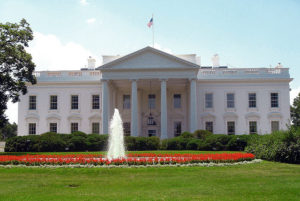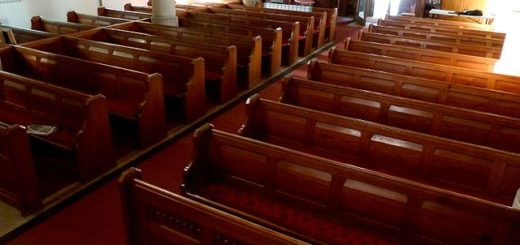The Presidency is a Secular, Not a Religious, Job

It’s hard to imagine now, but until the late 1950s Catholics seeking elected office were viewed with suspicion by Protestants who feared that Catholics would be more loyal to the Vatican than to U.S. citizens. Presidential candidate John F. Kennedy tackled this religious discrimination head-on less than two months before election day in 1960, when he told a roomful of Baptist clergy men, “I am the Democratic Party’s candidate for president, who happens also to be a Catholic. I do not speak for my church on public matters, and the church does not speak for me.”

1960 campaign button, courtesy of John F. Kennedy Presidential Library & Museum, Boston, MA
As a lifelong Catholic, and the niece of the Catholic Bishop Philip Hannan, who privately counseled then-U.S. Senator John F. Kennedy to tackle religious discrimination head-on, I am furious that Catholic bishops seek to treat the presidency a religious office instead of a secular position.
Do we really want any president to impose his faith traditions and doctrine on all citizens?
Would Catholic bishops want an Orthodox Jew or a Muslim elected president to impose his or her doctrine or faith practices on the whole country? Orthodox Jews, for example, believe the world was created 5,771 years ago and prohibit the use of electric devices on the Sabbath. Would the bishops expect that all official calendars be changed or ban electric-powered devices on Saturday? Of course not.

Yet leaders of the U.S. Conference of Catholic Bishops (USCCB) are pushing to issue a policy that would allow local bishops to deny communion to President Joe Biden, Speaker of the House Nancy Pelosi and other Catholics who back abortion options.
Despite pious statements that Biden – a church-going Catholic — is not fit to receive communion, conservative bishops gave a moral pass to former President Donald Trump, who lied constantly, committed adultery against all three wives and spent far more time on golf courses than in church. Although the bishops issued written statements criticizing Trump’s policies on immigration, the death penalty and other social issues, they rarely discussed those concerns from the pulpit.
Worse, they often fawned over Trump and his acolytes in public forums. Cardinal Tim Dolan of New York, for example, gave a shout-out to Trump during Easter Sunday Mass in St. Patrick’s Cathedral in 2020, when thousands were watching the Mass online due to the Covid-19 pandemic. The next day, during an appearance on the “Fox and Friends” morning TV show, which Trump watches, Cardinal Dolan expressed concern about the financial stability of Catholic schools during the pandemic and encouraged Trump to come through with federal financial support.
Another dart to the heart came in late September – six weeks before the presidential election – when Bill Barr, President Trump’s attorney general, received the Faithful Christian Laity award during the National Catholic Prayer Breakfast. The bishops’ own news agency noted in announcing the award that Barr “has overseen the resumption of executions of federal prisoners after a nearly two-decade halt; the U.S. bishops’ conference has spoken repeatedly to condemn the executions, as has Archbishop Charles Thompson of Indianapolis, whose diocese includes the federal prison in Terre Haute, where federal executions take place.”
Would this great evil result in denial of communion to Bill Barr? Apparently not.
The double standard about Republicans who embrace policies hostile to human life and dignity still makes me sick. And the controversy about the worthiness of Joe Biden, a devout church-goer, to receive communion — on top of the Catholic bishops’ hideous legacy of hidden sexual abuse of children — may result in millions of Catholics throwing in the towel on the church for good. I’m struggling not to be one of them.
Catholic leaders should help unify the faithful and draw them back to the church in four ways.
First, the bishops’ conference should publicly and forcefully vote to remove from their forthcoming pastoral letter any language that enables a bishop or priest to deny the Eucharist to a Catholic whose policy views they disagree with. Joe Biden has already been denied communion, when campaigning for president in South Carolina). Do you really think the same Southern bishop would deny communion to a white supremacist leader, or to pedophilic priests? Of course not. The bishops’ letter to the faithful should reinforce the broad scope of Catholic moral and social teaching, then let individuals continue making their own prayerful decisions on whether to receive communion.
Second, the Catholic church should be far more aggressive in framing its embrace of anti-poverty policies like food stamps, housing assistance and job training as “pro-life.” Three-fourths of women who had abortions in 2014 were poor or low-income, and Catholics made up the largest proportion (24%) of abortion patients who reported a religious affiliation, according to the Guttmacher Institute. A clearer Catholic witness on the benefit of spending on social supports might help persuade more Republicans who profess to be pro-life to vote accordingly.
Third, the bishops should launch a joyful, multicultural campaign of evangelization. Put simply, evangelization happens when the word of Jesus speaks to people’s hearts and minds. It should be about faith, not rules, especially because there seem to be different standards for Republicans and Democrats. If the Catholic bishops ignite joy, deep spirituality and unity among people of all backgrounds and traditions, Catholics can build more of the robust, church-focused communities many of us remember from our childhoods.
Finally, the bishops should reinforce that the Catholic church is one of the most powerful charitable institutions on the planet. Much of the church’s amazing work reducing poverty, welcoming immigrants and providing relief worldwide is known only to people who make charitable contributions or read Catholic newspapers. Cardinals, bishops and local priests should be more vibrant in using social media and the power of television to spread the word. This would go a long way toward warming the hearts of the faithful – particularly young people – who view the Catholic church as irrelevant in their lives.
It’s tough to be Catholic in a secular world. It’s even tougher when some Catholic bishops dismiss the actions of brazenly immoral leaders while holding others to tough account. Let’s join together to urge the cardinals and bishops who shepherd the faithful to fulfill the Catechism of the Catholic Church in proclaiming through words and deeds that God “calls together all men, scattered and divided by sin, into the unity of his family, the Church.”


